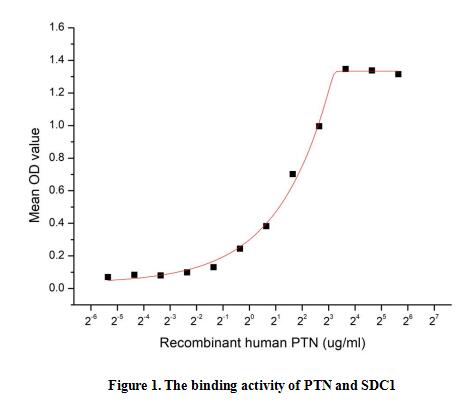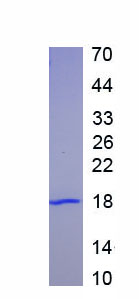Active Pleiotrophin (PTN) 

HARP; HBGF8; HBNF; NEGF1; Heparin Binding Growth Factor 8; Neurite Growth-Promoting Factor 1; Heparin Affin Regulatory Peptide; Heparin Binding Growth Associated Molecule
- UOM
- FOB US$ 252.00 US$ 630.00 US$ 1,260.00 US$ 3,780.00 US$ 9,450.00
- Quantity
Overview
Properties
- Product No.APB309Hu01
- Organism SpeciesHomo sapiens (Human) Same name, Different species.
- ApplicationsCell culture; Activity Assays.
Research use only - DownloadInstruction Manual
- CategoryCytokineTumor immunityNeuro science
- Buffer FormulationPBS, pH7.4, containing 0.01% SKL, 5% Trehalose.
- Traits Freeze-dried powder, Purity > 80%
- Isoelectric Point9.6
Sign into your account
Share a new citation as an author
Upload your experimental result
Review

Contact us
Please fill in the blank.
Activity test

Pleiotrophin (PTN) is a 136 amino acid secreted heparin-binding cytokine that signals diverse functions, including lineage-specific differentiation of glial progenitor cells, neurite outgrowth, and angiogenesis. A considerable amount of research has been carried out to understand the mechanisms by which PTN regulates these events. PTN has now been shown to bind a diverse collection of receptors including Syndecan 1 (SDC1). A functional binding ELISA assay was conducted to detect the interaction of recombinant human PTN and recombinant human SDC1. Briefly, PTN were diluted serially in PBS, with 0.01% BSA (pH 7.4). Duplicate samples of 100 µl were then transferred to SDC1-coated (2 ug/ml, 100 ul/well) microtiter wells and incubated for 1h at 37℃. Wells were washed with PBST and incubated for 1h with PTN pAb, then aspirated and washed 3 times. After incubation with HRP labelled secondary antibody, wells were aspirated and washed 5 times. With the addition of substrate solution, wells were incubated 15-25 minutes at 37℃. Finally, add 50µL stop solution to the wells and read at 450nm immediately. The binding activity of recombinant human PTN and recombinant human SDC1 was shown in Figure 1, the EC50 was 3.47 ug/ml.
Usage
Reconstitute in 10mM PBS (pH7.4) to a concentration of 0.1-1.0 mg/mL. Do not vortex.
Storage
Avoid repeated freeze/thaw cycles. Store at 2-8°C for one month. Aliquot and store at -80°C for 12 months.
Stability
The thermal stability is described by the loss rate. The loss rate was determined by accelerated thermal degradation test, that is, incubate the protein at 37°C for 48h, and no obvious degradation and precipitation were observed. The loss rate is less than 5% within the expiration date under appropriate storage condition.
Increment services
-
 BCA Protein Quantification Kit
BCA Protein Quantification Kit
-
 Molecular Mass Marker for Protein
Molecular Mass Marker for Protein
-
 Monoclonal Antibody Customized Service
Monoclonal Antibody Customized Service
-
 Polyclonal Antibody Customized Service
Polyclonal Antibody Customized Service
-
 Protein Activity Test Experiment Service
Protein Activity Test Experiment Service
-
 Electrophoretic Mobility Shift Assay (EMSA) Experiment Service
Electrophoretic Mobility Shift Assay (EMSA) Experiment Service
-
 Buffer
Buffer
-
 Lentivirus Packaging Experiment Service
Lentivirus Packaging Experiment Service
-
 Adenovirus Packaging Experiment Service
Adenovirus Packaging Experiment Service
-
 Real Time PCR Experimental Service
Real Time PCR Experimental Service
-
 Spike RBD Protein (S-RBD)
Spike RBD Protein (S-RBD)
-
 Protein G
Protein G
-
 Protein A
Protein A
Citations
- Suppression of lung adenocarcinoma through menin and polycomb gene-mediated repression of growth factor pleiotrophinMenin suppresses lung cancer through PTNNature: 2009273
- The Effects of Pleiotrophin in Proliferative Diabetic RetinopathyPubmed:25617851
- Depletion of Phagocytic Cells during Nonlethal Plasmodium yoelii Infection Causes Severe Malaria Characterized by Acute Renal Failure in Mice.Pubmed:26755155
- Evaluation of Serum Biomarkers (FGF-2, HGF, MIF and PTN) in Patients With Testicular Germ Cell CancerPubmed: 31662522







